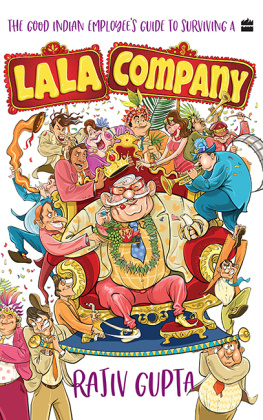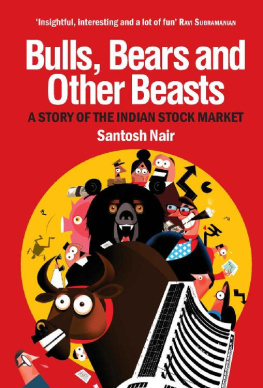Table of Contents


Praise for the book
There are many books on corporate czars but none on small businesses of India, which Rajiv figuratively describes as Lala Land. This book depicts struggles, innovativeness and coping mechanisms of owners and employees combined with very imaginative use of cartoon illustrations. It makes you laugh and cry at the follies and foibles of Lalas beautifully. An eminently readable book.
Subhash Chandra Garg, IAS
Former Finance, Economic Affairs and Power Secretary, Government of India
The term Lala Company gained prominence in the late 1970s, when the second generation of business owners were bitten by the professional manager bug. Even today a professional will encounter the archetypical Bauji, the Lala and the third-generation scion, in a family business. Comprehensive and humorous sketch of interpersonal relationships between the owner and the manager makes this book an enjoyable read. Learning: What to do for the professional and what not to do for the promoters.
Ajay Sharma
Director, Shree Baidyanath Ayurved Bhawan Pvt. Ltd
There is enough and more management literature on what family businesses should do. What stands out in this landmark book is illustrating what actually happens on the ground in many of them and its impact on business and everyone associated with it. It thus provides a converse way to learn, the all-important lessonhow not to conduct oneself as owners. How to prevent your trusted lieutenants from becoming the Frankenstein that you yourself cannot handle one day. Employees would also find extremely useful tips that can make the crucial difference between a failed and a highly successful career at a family business.
Dr Bhimaraya Metri
Director, Indian Institute of Management, Nagpur
Rajiv Guptas book is successful in capturing the three kinds of conflict within family businesses: those among family members; between owners and senior employees; and within the employees themselves. If not addressed properly and in time, these conflicts can bring down a running business. The book provides insights into the management of these conflicts.
Sonu Bhasin,
Founder, FAB-Families and Business,
Independent Director
This book is a laugh riot. Through well-researched examples, it conveys a hard-hitting message on how not to run a family business. Yet, if you find yourself stuck in one of them as an employee, then it tells you how to survive it. It shows how power struggle among family members and among their trusted lieutenants, driven by their own insecurities, ultimately takes the toll on the mothershipthe business itself. A must-read for anyone who is a part of a family business as well as those who are going to start one!
Nikunj Sanghi
Managing Director, J.S. Fourwheel Motors Pvt Ltd.
Former Chairman of the Automotive Skills
Development Council (ASDC)
Any business enterprise can be created and sustained over time on account of strong business fundamentals, apart from a solid foundation of these values: integrity, transparency, respect, compassion, and the like. Time and again we have seen family businesses managed by the second generation struggling to cope with the market realities on account of poor governance and major departures from the fundamental values of the organization. In most situations, family members think it is their birth right to manage the firm any way they like on account of their lineage. This book adequately shows the consequences of irrational decision-making and a lack of respect for stakeholders. Success of any organization largely depends on the people skills of the top management and the work ethic propounded to deliver sustained performance. Enterprises that dont pay attention to these are likely to fail over time.
Sharath Vijayaraghvan
Executive Director, TVS Sundaram Motors
To
All those who have ever worked at a Lala company.
Only you know how to endure all that goes on day after day. The pages that follow are to assure you that you are not alone in this, and there is always potential to bring about change.
Contents
I F YOU ASK people interested in business and business studies for a list of companies that have, according to them, grown to be regarded as institutions in Indiacharacterized by longevity, scrupulous ethics, public admiration, and resilient business practicesthen that list might mostly include professionally managed companies. Those, too, will be few such as TCS, HDFC, Kotak Mahindra Bank, Marico, and Biocon. Why do family-managed businesses not come to mind? It is a question worth pondering about. The truth is that India Inc. lacks serious players who are widely regarded as business institutions, i.e. the Lal Qila or Taj Mahal of corporate India! This is paradoxical because India Inc. comprises largely of family-managed enterprises.
A family business, like any other, aspires to grow. The founders wish that the future generations will protect the family legacy, honour and wealth, multiply it manifold, and build a formidable reputation in society.
If one looks at a large sample of family businesses, there will be many expected winners who had a head start. There will also be those who, despite such inherent advantages, did not reach their potential. On the other hand, there will be some underdogs who were once ignored at social gatherings due to their modest status, but later rose to build phenomenal business empires. One might discover that beliefs, values and conduct of owners and their core team has an important correlation with business outcomes. The business outcomes can be growth in top-line, bottom-line, and reputation.
While this book is targeted at employees, it can serve as a mirror to business owners and their coterie to help them see how their behaviour is seen by others. This might help them answer the question they often ask, Why cant we become like Tatas, Unilever, Godrej, M&M or Marico? Or Why cant we attract top talent when we are willing to pay higher salaries than them?
An unsuspecting employee does not know what to expect when he is signing up to join the type of family business described in this book. The ones working at such set-ups are unable to process whats going on. They wonder if whatever is happening to them, is an exception or a rule in such companies. Most importantly, they cannot decode the compulsions, motives, and insecurities of owners and their henchmen behind such conduct.
Through anecdotes and caricatures, which may appear irreverent, the message of the book is loud and clear for both employees as well as owners.
For the employee: Know what to expect. Dont be in a state of shock for too long. Understand the emotional fragility and spiritual handicap of people that causes them to act in a certain way. Learn how to navigate your way. Find a way to win the trust of powers that be, and enjoy respect, freedom and autonomy to make an impact and contribution.
For owners and their A Team: Reflect if the old ways of outsmarting everyone all the time or if acting like an all-powerful master will help you to build and scale. If you are still winning at the financial growth matrix while continuing with these ways, will it be sustainable? What impact will it have on relationships within the family, careers of those who work with you, and reverence in society that you so intensely crave for?
While the book focuses on family businesses, it does not mean that in well-managed family businesses or MNCs, none of the leaders exhibit any of these traits. Human emotions, power play, fear, and greed are present everywhere. Only their degree and expanse vary. What distinguishes the organizations that do well from those that dont, is self-awareness, self-reflection, empathy, and spiritual evolution of the people who lead them.















